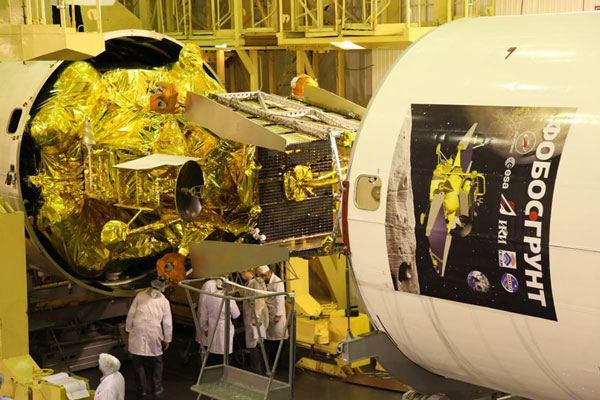The cause of the accident for the Station
On January 31, the Russian space agency Roscosmos announced the impact of cosmic radiation that caused Russia's "Phobos-Grunt" automatic interplanetary station to not complete the mission of exploring Mars.
Russian news agency RIA Novosti quoted Roscosmos director Vladimir Popovkin as saying the most likely cause of the "Phobos-Grunt" station's failure was the impact of strong charged molecules in the universe for the computer system on the ship, causing the computer's memory to malfunction immediately after the "Phobos-Grunt" left the launch pad.
However, Popovkin also suspected that unqualified imported chips used on spacecraft could be a factor in the failure of "Phobos-Grunt".

On November 8, 2011, Russia launched the "Phobos-Grunt" Station into space by Zenit boosters from Baikonur Space Center (Kazakhstan) with the main purpose of taking soil samples from Mars's Phobos satellite to study. . This is one of the most ambitious projects in the history of Mars exploration, costing up to 5 billion rubles (165 million USD).
However, after successfully separating from the rocket, "Phobos-Grunt" deviated from the trajectory towards Mars and lost contact with the ground. Much of the "Phobos-Grunt" exploration station was burned when falling in a thick atmosphere, the last pieces of the station fell to the Indian Ocean in mid-May.
In a related statement, Popovkin said Russia plans to re-test the "Phobos-Grunt Station " Mars exploration mission if the country fails to reach an agreement with the European Space Agency on chapter participation. "ExoMars" (Foreign Biology on Mars) of this agency.
Speaking to reporters, Popovkin said the Russian Space Agency was conducting consultations with the European Space Agency about Russia's participation in the "ExoMars" project . If the two sides fail to reach an agreement, Russia will conduct a re-testing of the mission of the "Phobos-Grunt" Exploration Station .
- Handbook of accident first aid at home
- What do we need to do when we encounter a road accident?
- 13 splendid train stations like the palace in Russia
- The most glittery subway stations in the world
- The Atlantis spacecraft landed on the ISS smoothly
- Model of people who can survive in traffic accidents
- The 5 most shocking moments in the history of the aerospace industry
- China plans to launch Tiangong Space Station similar to ISS by 2020
- Why should not move the accident victims?
- Otzi tape died of an accident while climbing the mountain
- NASA celebrates 40 years of the first space station project
- Russia makes devices to warn of traffic accidents
 Van Allen's belt and evidence that the Apollo 11 mission to the Moon was myth
Van Allen's belt and evidence that the Apollo 11 mission to the Moon was myth The levels of civilization in the universe (Kardashev scale)
The levels of civilization in the universe (Kardashev scale) Today Mars, the sun and the Earth are aligned
Today Mars, the sun and the Earth are aligned The Amazon owner announced a secret plan to build a space base for thousands of people
The Amazon owner announced a secret plan to build a space base for thousands of people